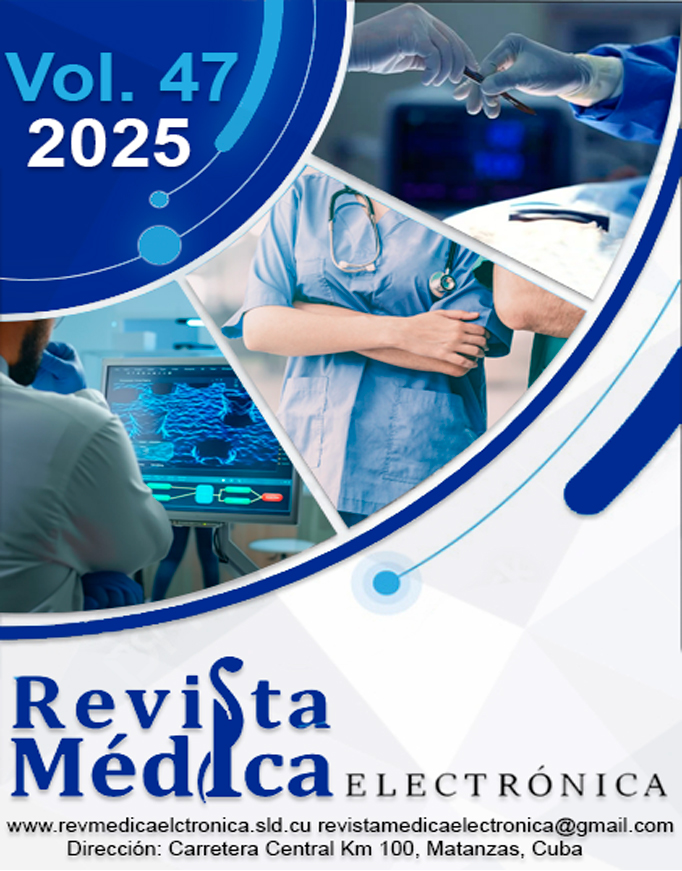Motivation for digital health management in Bachelor of Nursing students
Keywords:
motivation; digital health; management; health trainingAbstract
Introduction: Computer technologies have been introduced in the fields of human activity, especially health. However, no research works are detected that train professionals in this sector, especially nurses, to apply these advances to their daily practice. From the exploratory diagnosis carried out, it is detected that there is a poor motivation for digital health management in nursing students.
Objective: To assess a system of actions to increase motivation for digital health in students of the fifth year of the Bachelor’s Degree in Nursing.
Methods: The last year of the degree was selected, as this is the year in which digital health content must be introduced and students have greater preparation to learn about these contents due to their generalizing nature. The selected methods were applied in three sections to assess the increase in students with the presence of indicators of motivation for digital health.
Results: The application of the instruments allowed appreciating a sustained increase in the number of students who have indicators related to motivation for digital health management. The components of digital health and its management are incorporated into their life project as nursing professionals. Three moments of the development of motivation for digital health are obtained.
Conclusions: The proposed system of actions managed to increase the number of students in the fifth year of Nursing, with the presence of the indicators that characterize the motivation for digital health. The students expressed their satisfaction with the system of actions and the motivation for these technologies.
Downloads
References
1. Maqbool B, Herold S. Potential effectiveness and efficiency issues in usability evaluation within digital health: A systematic literature review. J Syst Software [Internet]. 2024 [citado 15/07/2024];208:111881. Disponible en: https://www.sciencedirect.com/science/article/pii/S0164121223002765
2. Verma A, Behera A, Kumar R, et al. Mapping of digital health interventions for the self-management of COPD: A systematic review. Clin Epidemiol Glob Health [Internet]. 2023 [citado 15/07/2024];24:101427. Disponible en: https://www.sciencedirect.com/science/article/pii/S2213398423002142
3. Veraksa NE, Veresov NN, Veraksa AN, et al. Modern Problems of Children’s Play: Cultural-Historical Context. Cult-Hist Psychol [Internet]. 2020 [citado 15/07/2024];16(3):60-70. Disponible en: https://psyjournals.ru/en/journals/chp/archive/2020_n3/Veraksa_Veresov_Veraksa_Sukhikh
4. Scogin SC, Marks M, Mader C, et al. Building motivationally supportive course-based research experiences for undergraduates: a self-determination theory perspective. High Educ Pedagog [Internet]. 2023 [citado 18/07/2024];8(1):2165528. Disponible en: https://www.tandfonline.com/doi/pdf/10.1080/23752696.2023.2165528
5. Aparecida-Vieira D, Satyro D, Vila Granado SRP. O patrimônio vivencial de um educando: Pedro quer escrever um livro. Trab Ling Aplic [Internet]. 2022 [citado 18/07/2024];(61):350-62. Disponible en: https://www.scielo.br/j/tla/a/VykdW56Bt44JPV7VXXxjG9n/?format=pdf&lang=pt
6. Torres-Carrillo SS, Balseca Basantes JE, Chiliquinga Véjar LC. El aprendizaje servicio para elevar la motivación profesional en la Carrera Trabajo Social de la Universidad Técnica de Ambato. Reidocrea [Internet]. 2023 [citado 18/07/2024];12(6):62-75. Disponible en: https://digibug.ugr.es/bitstream/handle/10481/80319/12-06.pdf?sequence=1&isAllowed=y
7. Hernández-Sampieri R, Fernández-Collado C, Baptista-Lucio MP. Metodología de la investigación [Internet]. Madrid: McGraw Hill España; 2014 [citado 18/07/2024]. 634 p. Disponible en: https://dialnet.unirioja.es/servlet/libro?codigo=775008&orden=0&info=open_link_libro
8. Moreno-García MC. El aprendizaje creativo en la matemática, su contribución a la formación del ingeniero industrial. Atenas [Internet]. 2019 [citado 18/07/2024];2(46):47-63. Disponible en: https://atenas.umcc.cu/index.php/atenas/article/download/342/561
9. Torres-Oliveira C, Mitjáns-Martínez A. Expresiones de la subjetividad social en el aula y creatividad en el aprendizaje: un estudio de caso. Alternativas cubanas en Psicología [Internet]. 2020 [citado 18/07/2024];8(23). Disponible en: https://www.alfepsi.org/wp-content/uploads/2020/06/23-altermativas-cubanas-en-psicologia-v8n23.pdf
10. Segura Urrutia D, Blanco Alfonso BL, González Hernández W. Aprendizaje creativo de la ingeniería del software en la formación del profesional informático en la Universidad de Matanzas. Acta Universitaria [Internet]. 2024 [citado 18/07/2024];34:e3949. Disponible en: https://www.actauniversitaria.ugto.mx/index.php/acta/article/download/3949/4137
11. Merke S, Ganushchak L, van Steensel R. Effects of additions to independent silent reading on students’ reading proficiency, motivation, and behavior: Results of a meta-analysis. Educ Res Rev [Internet]. 2024 [citado 19/07/2024];42:100572. Disponible en: https://www.sciencedirect.com/science/article/pii/S1747938X23000659
12. Torbergsen H, Utvær BK, Haugan G. Nursing students’ perceived autonomy-support by teachers affects their intrinsic motivation, study effort, and perceived learning outcomes. Learning and Motivation [Internet]. 2023 [citado 19/08/2024];81(101856). Disponible en: https://www.sciencedirect.com/science/article/pii/S0023969022000765
13. Kwak MJ, Kim DJ. Investigating psychological and motivational predictors of problematic smartphone use among Smartphone-based Social Networking Service (SNS) users. Addict Behav Rep [Internet]. 2023 [citado 19/08/2024];18(100506). Disponible en: https://www.sciencedirect.com/science/article/pii/S2352853223000287
14. Amin-Husni NH, Farhana-Jumaat N, Tasir Z. Investigating Student’s Cognitive Engagement, Motivation and Cognitive Retention in Learning Management System. Int J Educ Technol [Internet]. 2022 [citado 19/08/2024];17(9):184-200. Disponible en: https://www.learntechlib.org/p/223091/article_223091.pdf
15. Backfisch I, Lachner A, Hische C, et al. Professional knowledge or motivation? Investigating the role of teachers’ expertise on the quality of technology-enhanced lesson plans. Learn Instr [Internet]. 2020 [citado 19/08/2024];66:101300. Disponible en: https://www.sciencedirect.com/science/article/abs/pii/S0959475219301811
Downloads
Published
How to Cite
Issue
Section
License
Copyright (c) 2025 Revista Médica Electrónica (Medical Electronic Journal)

This work is licensed under a Creative Commons Attribution-NonCommercial 4.0 International License.
All content published in this journal is Open Access, distributed under the terms of the CC BY-NC 4.0 License.
It allows:
- Copy and redistribute published material in any medium or format.
- Adapt the content.
This will be done under the following terms:
- Attribute the authors' credits and indicate whether changes were made, in which case it must be in a reasonable way.
- Non-commercial use.
- Recognize the journal where it is published.
The copyrights of each article are maintained, without restrictions.






